A political party recently marked the 138th foundation day of Indian National Congress (INC) on December 28.

How the INC was founded?
- The INC was founded on December 28, 1885.
- The organization was founded by the English bureaucrat Allan Octavian Hume.
- On that day, 72 social reformers, journalists, and lawyers gathered at Gokuldas Tejpal Sanskrit College in Bombay for the first session of the INC.
Stated objectives of INC included-
- First, the amalgamation of all the various elements that comprise India’s population into a single national whole.
- Second, the nation’s gradual regeneration along all lines, spiritual, moral, social, and political; and third, the consolidation of the union between England and India.
Real motive behind: ‘Safety Valve’ Theory
- At the time, the goal of this group was not to demand independence from the ongoing colonial rule, but rather to influence British government policies in favor of Indians.
- Its goal is frequently described as providing a “safety valve” as a time for Indians to air their grievances and frustrations.
- According to Mr. Hume, the Congress organization was “only one result of the labors of a body of cultured men, mostly Indians, who hound themselves together to labor silently for the good of India.”
Transformation toward freedom movement
Ans. Famous for 3P’s: Prayers, Protest and Petitions
- The party’s efforts to change colonial administrators’ attitudes and policies regarding Indian rights and powers continued.
- Members frequently demonstrated against British colonialism, such as the Bengal famine and the drain of wealth from India.
- However, at this point, protests were typically limited to prayers, petitions, and protests, including letters to authorities.
- As British rule continued, there were growing differences in how the party should function.
Strength of INC
- Diverse participation: Having members who held different ideological positions was one of the party’s biggest strengths, helping it appeal to a broad section of Indian society.
- Pan-India organization: Its popularity spread throughout the country.
INC was initially criticized
- Non-effective: Hume and the party were chastised by the British for attempting to change existing systems that favored them, and by some Indians for failing to produce significant results.
- Elite-organization: The party was mostly made up of educated, upper-class people who had likely studied abroad.
Splits and reconvening
- In Surat in 1906, there was a split between the’moderates’ led by Gopal Krishna Gokhale and Surendranath Banerjea, and the ‘extremists’ led by Bal Gangadhar Tilak.
- While Tilak and Lala Lajpat Rai wanted the Congress to boycott the Prince of Wales’ visit in protest of the Bengal partition a year before, the moderates were opposed.
- However, by 1915, the Bombay session saw these two groups reuniting as one.
- Even after the party came to completely dominate successive general elections under PM Jawaharlal Nehru, the pattern of splits and eventual cohesion continued.
Source: https://indianexpress.com/article/explained/explained-politics/on-congress-foundation-day-a-brief-history-of-the-party-8348538/
